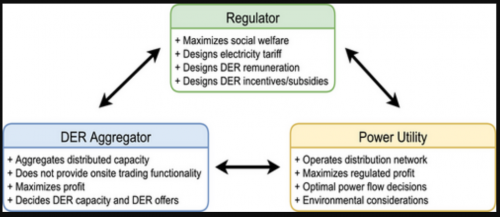-
Comments to DOE on Proposed Efficiency Standards for Conventional Cooking Products and External Power Supplies
We submitted comment letters to the Department of Energy (DOE) on its proposed rules to strengthen energy conservation standards, respectively, for consumer conventional cooking products and external power supplies. Our comments applaud the agency for appropriately applying the social cost of greenhouse gases to estimate the climate benefits of the proposed standards. We also suggest that DOE apply additional analysis to each rule using draft updated climate-damage valuations that the Environmental Protection Agency released in November 2022.
-
Comments to NY Public Service Commission on Energy Storage Roadmap
We submitted recommendations to the New York Public Service Commission regarding New York’s 6 GW Energy Storage Roadmap: Policy Options for Continued Growth in Energy Storage, a document that analyzes the need to increase New York’s storage target to 6 GW and the barriers to storage deployment, and provides policy recommendations to help the state achieve 6GW of storage deployment by 2030.
-
Policy Integrity to Assist with New EPA Environmental Justice Program
As part of a coalition led by WE ACT for Environmental Justice, the Policy Integrity will help support a newly formed Environmental Justice Thriving Communities Technical Assistance Center.
-

Value of Distribution System Information for DER Deployment
Integration of Distributed Energy Resources (DERs) in power systems exacerbates the existing information problems between power utilities and regulators. DER policies oblivious to the trilemma of information asymmetry between power utilities, DER aggregators, and regulators result in distorted price signals to DER investors, and socially inefficient DER roll-out. Therefore, in this paper, a game-theoretic approach is proposed for modeling information asymmetry in distribution network information and consumer data between the DER aggregators and the power utilities.
-
Comments to Council on Environmental Quality on Interim Guidance on Considering Climate Change Under NEPA
In January, the Council on Environmental Quality published interim guidance providing best practices to federal agencies on the consideration of climate change in environmental reviews conducted under the National Environmental Policy Act. The guidance provides helpful direction to agencies on assessing how proposed actions and their alternatives (1) will contribute to climate change through their greenhouse gas emissions; and (2) will potentially be affected or have their environmental consequences exacerbated by climate change impacts. Our comment commends CEQ on its thorough guidance and provides recommendations to strengthen both areas.
-
Amicus Brief Defending NHTSA Corporate Average Fuel Economy Standards
In May 2022, the National Highway Traffic Safety Administration (NHTSA) finalized a rule to increase its corporate average fuel economy (CAFE) standards for passenger cars and light trucks for model years 2024–2026. A group of fuel and petrochemical manufacturers and states challenged the standards in the U.S. Court of Appeals for the D.C. Circuit, arguing primarily that the Energy Policy and Conservation Act bars NHTSA from including electric vehicles in the analytical baseline for the new standards. Our amicus brief explains that longstanding administrative guidance and case law direct agencies to develop baselines that reflect their best assessment of the real world absent any new agency action. In the context of this rulemaking, that guidance and case law required NHTSA to project how many and what kinds of vehicles—including electric (and plug-in hybrid electric) vehicles—would be built and sold if it did not issue new CAFE standards, which is what NHTSA did here. Our amicus brief also explains that NHTSA has consistently prepared baselines for prior CAFE standards in this manner.
-
Comments to DOE on Proposed Efficiency Standards for General Service Lamps and Distribution Transformers
We submitted comment letters to the Department of Energy (DOE) on its proposed rules to strengthen energy conservation standards for general service lamps and distribution transformers. Our comments applaud the agency for appropriately applying the social cost of greenhouse gases to estimate the climate benefits of the proposed standards. We also suggest that DOE apply additional analysis to each rule using draft updated climate-damage valuations that the Environmental Protection Agency released in November 2022.
-
Amicus Brief Defending EPA Tailpipe Greenhouse Gas Emission Standards
In December 2021, the Environmental Protection Agency finalized a regulation to strengthen its greenhouse gas emission standards for light-duty vehicles. Although regulated automakers support EPA’s approach, a group of states and oil-and-gas companies have challenged the standards in the U.S. Court of Appeals for the D.C. Circuit, claiming that the standards misapply economic principles and violate the major questions doctrine. In our amicus brief, we explain that EPA’s regulation is consistent with sound economics and established practice.
-
Comments to DOE on Energy Efficiency Standards for Federal Buildings
We submitted comments to the Department of Energy (DOE) on its proposed rule to strengthen energy conservation standards for new and renovated federal buildings. Our comments offer support for the agency's choice to apply the social cost of greenhouse gases to estimate the climate effects of the proposed standards. We also suggest that DOE apply additional analysis using draft updated climate-damage valuations that the Environmental Protection Agency recently released.
-
EPA Restores Legal Foundation to Limit Mercury & Air Toxics from the Power Sector
This month, EPA restored the legal foundation for regulating emissions of mercury and other hazardous air pollutants (HAPs) from coal- and oil-fired power plants under section 112 of the Clean Air Act. Policy Integrity has long recommended that EPA adopt such an approach that considers unquantified and ancillary effects, as is consistent with the best economic practices and the law, including through our comments on the 2022 proposed rule and an amicus brief opposing the 2020 finding.








